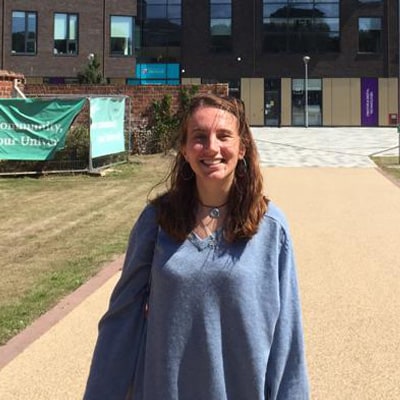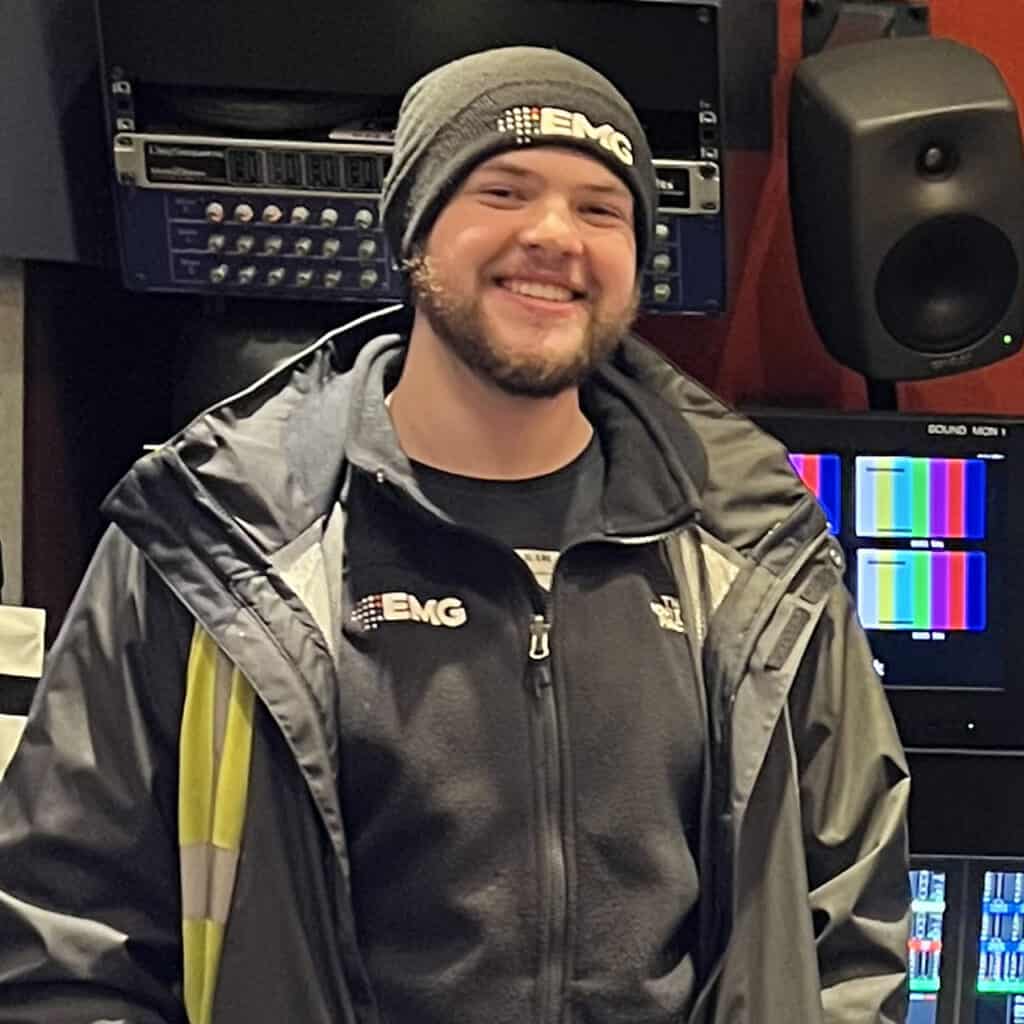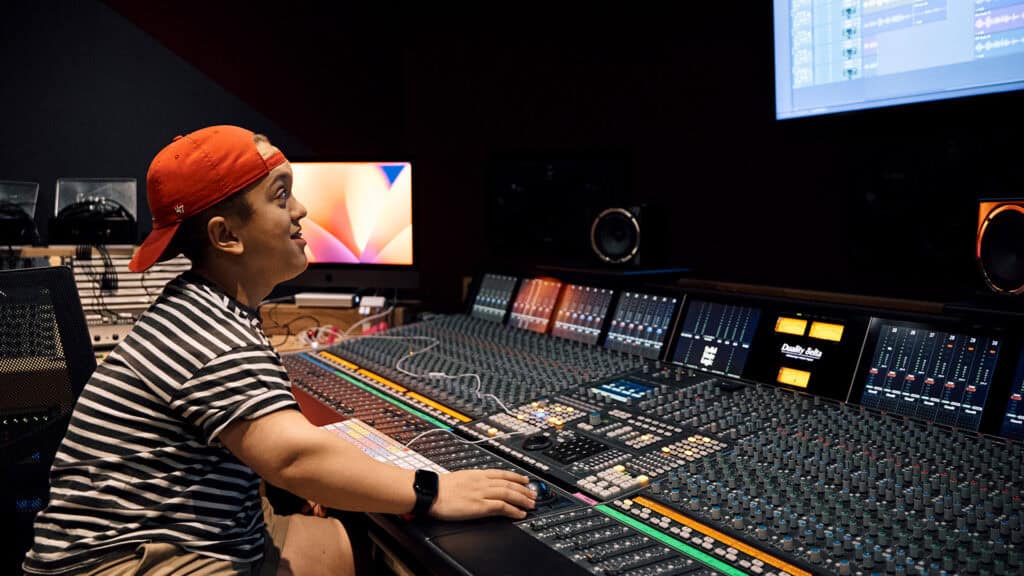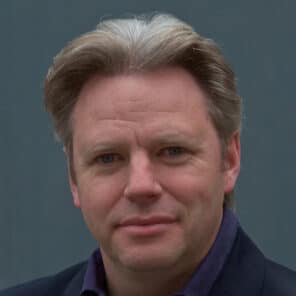94%
positivity for facilities support learning
National Student Survey 2024
Top 20
in the UK for Media and Film Studies
Guardian University Guide 2025
91%
positivity for overall academic support
National Student Survey 2024
Join us at one of our Open Days!
Saturday 11 October
Sunday 26 October
Saturday 22 November
Saturday 11 October
Sunday 26 October
Saturday 22 November
Our next Open Day is in:
Overview
Explore the technical, theoretical and experiential elements of audio and music technologies
Learn to create professional-level audio projects
Our BA (Hons) Audio Production and Music Technologies degree gives you a thorough technical, theoretical and experiential understanding in core audio and music technologies and industrial practice.
You will learn to:
- Record, engineer and produce music
- Design sound for film, TV and games
- Compose music for the moving image
- Create sample libraries
- Understand studio technologies and infrastructure.
Use industry-standard equipment and software
In your first year, most of your learning will take place in the University’s Professional Recording Studio. Built around an SSL Duality Console, the studio features the very latest Pro Tools MTRX system, an extensive range of high-end outboard processing including:
- Manley
- Bricasti
- Neve
- API
- Universal Audio
- ATC 5.1 monitoring
You will learn in our professional Soho-standard dubbing and grading suite during your second year, which features:
- Avid S6 console
- Pro Tools MTRX system
- 4K projection
- Dolby Atmos capable ATC monitoring
You will also have access to our contemporary Mac Suite, which includes Pro Tools, Cubase and Logic software, as well as professional sample libraries from Spitfire Audio and Adobe Suite.
Learn from our expert and award-winning staff
Our team of dedicated, high-qualified professional practitioners and current industry figures, include award-winning directors, producers, actors, writers, editors and composers from across animation, film, TV and games.
Join our collaborative community
Throughout your degree, you will collaborate with students across the Department of Creative Industries to gain an exceptional understanding of production practices and technology application, enhancing your vital employability skills.
Partnerships
As a part of the Department of Creative Industries you will benefit from our industry partnerships with companies including HyperX, DXRacer, Twitch, ARRI and AVID, and be able to access to industry-standard software such as Nuke, Maya and Houdini.








The Course
Develop key technical skills and equipment knowledge to thrive in audio production
Year One
In your first year, you will spend much of your time in the recording studio working on acquiring professional recording techniques, learning how to use the SSL Duality console, the patchbay and Pro Tools DAW software.
You will also learn advanced sequencing and programming techniques, and the be introduced to the fundamentals of acoustics.
Year Two
Your second year expands your knowledge and skills in audio production and music technologies as you begin to branch out in music mastering, sound design, foley, ADR, sound engineering and on-site recording.
Year Three
In your final year, you will undertake a final major project in the form of a portfolio of creative work, or a written research dissertation that acts as a culmination of your learning throughout your degree.
In addition, you will look to develop the your creative and technical skills in sound design and basic audio implementation for video games, audio post production, film and TV.
Modules
Select a year
Fundamentals of Acoustics and Studio Technologies
This theoretical and technically-focused module introduces you to the fundamental principles of acoustics and their specific relevance to audio production and digital music technologies.
You will gain a intellectual framework for the practically-focused and applied modules in your first year.
The topics covered include:
- The physics of sound
- Harmonics
- Timbre and tuning systems
- Spatial and surround sound
- Digital audio systems.
Pro Tools 101
This module introduces you to the de facto industry standard audio recording software found in professional recording studios and post-production facilities throughout the world.
Pro Tools 110
This module builds upon the skills and knowledge acquired in Pro Tools 101 and introduces you to more advanced and complex session creation and management, and more sophisticated audio processing, video handling, mixing and editing functionality.
The module also supports you in your operation of the recording studio on the Studio and Recording Techniques 2 module.
Upon completion of this module, you are encouraged to take the Avid Certified User: Pro Tools certification exam.
Sequencing and Programming
This practical module explores how music is created and produced ‘in-the-box’.
You will work in the hybrid studio and use a range of DAW software and virtual instruments including synthesizer emulations, ROMplers and sample players.
After being introduced to core sequencing techniques and automation processes, you will progress to the more advanced programming of orchestral samples and use notation software for facilitating live recording.
Studio & Recording Techniques
This highly practical module, taught across two semesters, will introduce you to the operation of the music studio and a range of industry-standard studio recording techniques. You’ll be introduced to Pro Tools – the current de facto industry standard audio recording software found in professional recording studios and post-production facilities throughout the world.
In the second semester, you will build upon the core skills and techniques already acquired and explore more advanced functionality of the studio. This will develop your proficiency and experience in more complex recording methods.
Field and Location Recording
During this practical module, you will develop the skills and specialist techniques required for recording sources in the field as well as actor dialogue and sound on set and location for film and TV productions.
You will work alongside peers and professionals to record dialogue and sound during the department’s commissioned short film.
Music Mastering
This practical module builds on the skills you gain in the Sound Engineering and Music Production module and explores the complex technical and creative post-production processes involved in mastering music for a variety of commercial output formats. You will be assessed by producing stereo and surround format masters.
Sound Design, ADR and Foley
In this module, you will explore the creative processes and core techniques that underpin and define the work of sound designers, ADR recorders and Foley artists.
As part of this, you will examine:
- when and why these professionals would be needed
- how they design “sound worlds” and “characters” to match movements and interactions
- the creation of sounds for productions set in the future, imaginary remote planets or featuring fictional creatures.
Sound Engineering and Music Production
This practical double module develops and extends the studio and recording techniques you developed in previous modules.
Through this, the module explores the more advanced creative skills and technical processes required to prepare, engineer and produce recorded music to a commercially viable standard.
Synthesis and Sampling
As part of your career in the music and recording industry you could design and program patches for hardware and software synthesizers and create custom sample libraries for commercial release.
This module explores key synthesis methods and uses hardware and software synthesizers and core sampling techniques to prepare you for more advanced, project-based work in this area in your final year.
Assessments
You will be assessed through a project where you design and construct an instrument in Kontakt, and a practical exam in a music studio.
Practical Project
This practical project module will allow you to engage with an area of the industry of your choosing in order to pursue enthusiasms and further develop your skills in commercial music production or a film sound discipline.
Advanced Sampling Project
This project-based module will build on the techniques and skills you gained during in the Synthesis and Sampling module. You will explore sampling technologies and practices and design a commercially viable sampled instrument library.
Audio for Video Games
This practical module develops your creative and technical skills in sound design and basic audio implementation specifically for video games, as well as covers the creation of a broad range of sound assets and audio related content.
You are also introduced to industry standard middleware, which enables sound designers to implement their assets in game.
You can take either this module or the ‘Advanced Sampling Project’ module.
Audio Post-Production
This practical module builds upon key skills acquired in the Sound Engineering and Music Production, Mastering Music, and Sound Design, ADR and Foley modules and explores the complex technical and creative post-production processes involved in ‘dubbing’ or ‘mixing’ sound and music for film and TV.
Specialist Project or Research Project
In this independent, project-driven, module, you have the opportunity to pursue your own enthusiasms and specialisms. This will usually take the form of a portfolio of creative work or a written research project.
Studio Infrastructures, IT and Design
This module aims to build significantly upon the theoretical knowledge acquired at Level 4 in Virtual Studio Technologies and Fundamentals of Acoustics, and practical studio experience gained throughout the BA thus far.
Delivered with input from one of our industry partners, the module explores the industrial approaches and methodologies involved in the research, planning, design, technical specification and ultimate construction of professional hybrid studios.
Group work is used to simulate industrial working practices and prepare students for potential routes to employment within this part of the music technology and design industry.
Collaborative Project
The Creative and Digital Technologies Department is founded on the principle of collaborative practice and actively encourages students to work across disciplines in the creation of film and related media content.
This double module allows BA Audio Production and Music Technology students to work alongside their colleagues on the Digital Film Production course as part of a tight-knit production team.
Here, you will take charge of the sound and music related roles on the Dissertation Film Project: on-set and on-location sound recording; sound design, ADR and Foley; score composition; and the production of the final audio dub.
Teaching and Assessment
Feel the support of our experienced and expert staff
Teaching
You will be taught by a range of experts in audio-based technologies from composers to recording engineers.
Our commitment to smaller class sizes allows you to feel more confident to discuss your ideas in a supportive environment and allows your tutors get to know you and how best to aid your development.
Classes include lectures, seminars, skills sessions, technical classes and practical workshops. You will need to complete independent study outside scheduled teaching and will take on practical individual and group work throughout your degree.
Meet programme coordinator Professor Stephen Baysted
Stephen Baysted
Award-winning British Film, TV and Video Game composer Stephen Baysted is well known for his versatility and for his emotionally charged and expressively powerful music.
Stephen’s acclaimed music scores have been enjoyed by viewers and players worldwide in a succession of award-winning films, TV programmes and video games, including the multi-award-winning Project Cars franchise.
Assessment
You will be assessed using a range of assignments, including:
- Written coursework
- Practical coursework
- Practical examination
- Presentations (screenings and auditions)
- Portfolio and project work.
Experience
Discover industry-standard software and equipment
Study in our £35 million Tech Park
Our Bognor Regis campus boasts the £35m Tech Park and brings together science, technology, engineering, arts and mathematics courses on one state-of-the-art site.
Facilities include:
- SSL Duality Console
- Pro Tools MTRX system
- An extensive range of Manley high-end outboard processing
- Bricasti, Neve, API and Universal Audio
- ATC 5.1 monitoring
- Avid S6 console
- Soho-standard dubbing and grading suite
- Mac suite with Pro Tools, Cubase and Logic software
- Professional sample libraries from Spitfire Audio and Adobe Suite.
Post-production facilities and recording studios
Discover our range of facilities for audio and visual media post-production.
Expert staff
Our industry-experienced staff get to know you and your learning needs to help you thrive.
Learning Resource Centre
The Learning Resource Centre (LRC) contains the library, a café, IT/teaching rooms and the Support and Information Zone (SIZ).
Library
Our campus library holds more than 200,000 books and over 500,000 eBooks.
Seize professional networking opportunities
The University of Chichester’s Tech Park has played host to several high-profile recording sessions for feature films, TV dramas and video games.
Students from our BA (Hons) Audio Production and Music Technologies course are often involved in the recording, assisting the sound engineers with the complex studio and microphone setups, and gaining invaluable experience working in a high-pressure commercial context with leading industry practitioners.
Our ability as a university to host such high-profile commercial projects really does make our courses, and the wider opportunities we can offer you, unique.

Poppy
Study Abroad
Explore the opportunity to study part of your course abroad
As a student at the University of Chichester, you can explore opportunities to study abroad during your studies to enrich your educational experiences.
It’s a chance to broaden your horizons, a great opportunity to meet new people, undertake further travelling and to immerse yourself within a new culture.
You will be fully supported throughout the process to help find the right destination and institution for you and your course. We can take you through everything that you will need to consider, from visas to financial support, to ensure you get the best out of your time studying abroad.
Careers
Graduate ready for a range of audio careers
Music technology and audio production are used across the creative industries in games, film, TV, advertising and more. This degree will introduce you to a range of audio careers as you develop the technical, creative and industrial skills you will need to succeed in audio post-production.
You could work in:
- Professional recording studios
- Video games studios
- Gaming
- TV and film
- Advertising.

Josh
Further study
You could decide to continue your studies to postgraduate level.
Our postgraduate degrees include:
- MA Screen Acting
- MA Composition for Film, TV and Games
- PGCE
- PhD Research.
University of Chichester alumni who have completed a full undergraduate degree at the University will receive a 15% discount on their postgraduate fees.
Course Costs
Course Fees 2025/26
UK fee
International fee
EU/EEA Fee Reduction Scholarship
EU/EEA students automatically pay the equivalent of UK fees via the EU/EEA Fee Reduction Scholarship
For further details about fees, please see our Tuition Fee page.
For further details about international scholarships, please see our Scholarships page.
To find out about any additional costs on this course, please see our Additional Costs page.
Entry Requirements
Applying through Clearing
We know that you are so much more than your grades, which is why we take your aspirations, passion and personality into account. Through Clearing, we’re taking a flexible approach. Even if your grades are a little different from those advertised, please contact us – we’ll consider every application individually.
Typical offers (individual offers may vary):
UCAS
A Levels
BTEC/Cambridge Technical
Access to HE Diploma
IB
IELTS
Contextual offers
We believe everyone deserves an equal opportunity to pursue higher education, regardless of their background.
When we receive your application we consider your personal circumstances and the factors surrounding your achievements to see if you are eligible for a contextual offer. This is an offer with a reduced entry tariff – typically the equivalent of 16 fewer UCAS points (two A-level grades).
Find out more about our contextual offers.






